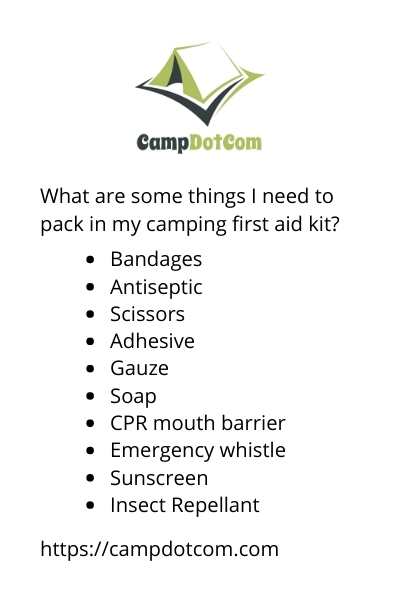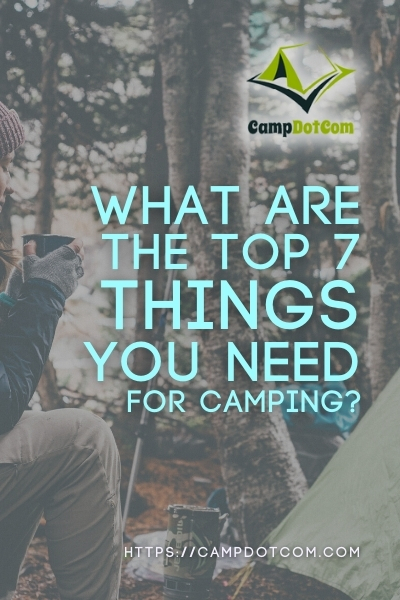A week in the great outdoors can be an incredible adventure or a real-life nightmare A good or bad camping experience is usually determined by one factor: what you packed (or did not pack) for the trip.

More Things To Know About 7 Things You Need For Camping
As an Amazon Associate, I earn from qualifying purchases. Some of the links in this article are affiliate links. This means that, at zero cost to you, I will earn an affiliate commission if you click through the link and finalize a purchase.

Having the necessary camping gear in your backpack can mean the difference between a relaxing vacation in the woods and a trip to the nearest emergency room.
Whether you're a first-time camper or a seasoned survivalist, don't leave home without these must-haves for a nature outing.
1. Camping Tent
Even if you prefer sleeping under the stars, you should always have a tent or other form of emergency shelter on hand in case of an emergency. A midnight deluge, freak snowstorm, or heavy dew, on the other hand, will leave you drenched, miserable, and at risk of hypothermia.
A tent can also protect you and your belongings from strong winds. Whether you choose the best two person tent or a larger cabin-style tent, make sure you bring all of the necessary accessories, including rope, tent poles, stakes, and a rain fly.
2. Bottle Of Water
Water is essential for survival in the great outdoors, and the further you get from civilization, the faster it appears to run out. The last thing any camper wants is to be without clean water, especially since drinking from a pond or lake can cause serious illness from foreign bacteria.
Even if you're only a few feet from the wilderness, bring a day's supply of the wet stuff in a large container. Then, in case you need to refill from a nearby stream, keep a filter or water purification tablets on hand.
3. Emergency First Aid Kit
While camping is unlikely to result in a life-threatening injury, a long day of hiking can result in blisters that require bandaging. Small cuts and scrapes can also become infected quickly if left untreated, so keep bandages and antiseptic on hand.
Other items in your first aid kit should include scissors, adhesive, gauze, soap, a CPR mouth barrier, and an emergency whistle. Make sure to include sunscreen and insect repellent as well. Sunburn and bug bites can put an end to your trip just as quickly as a laceration.
4. Additional Blankets
Extra blankets will come in handy regardless of the weather. You'll use them to cover tables, create a clean spot on the ground, wrap up late at night or early in the morning, and as extra padding between your sleeping bag and the ground.
5. The Proper Footwear
Some of this will depend on your plans while camping, but a good rule of thumb is to bring a pair of flip-flops or other easy slip-on shoes, as well as a pair of multi-purpose hiking shoes.
Slip-on shoes: If you plan on spending most of your time at your campsite, roasting marshmallows, and going in and out of your tent, you'll be glad to have some slip-ons for you and your kids. When going in and out of the tent, kids should be able to easily take their shoes on and off so they don't track dirt and rocks in.
6. Lanterns And Flashlights
Lanterns are always useful when the power goes out. They're extremely bright when fully open, but you can easily adjust the brightness by opening and closing them. Consider accordion-style.
Lanterns are a must-have for hands-free lighting after the campfire has been extinguished for the night. Also, have some small flashlights on hand for wandering around at night or playing flashlight tag.
7. Map And Compass Or GPS
If your camping itinerary includes hiking in remote areas, bring a map and compass or GPS. The sun's constant movement can make forest landmarks appear unfamiliar, causing hikers to become disoriented.
Unprepared campers have occasionally spent days wandering the woods before being rescued or finding their way back to camp.
Getting lost or stranded in the woods, especially with a limited supply of water, is no laughing matter. Even if your children only want to walk down to the nearest creek from your campsite, make sure they have a safe way back.
While the camping equipment on this list can be considered essentials, there are undoubtedly additional items required for a successful camping trip. It’s always a good idea to make a camping checklist before going on a trip.
